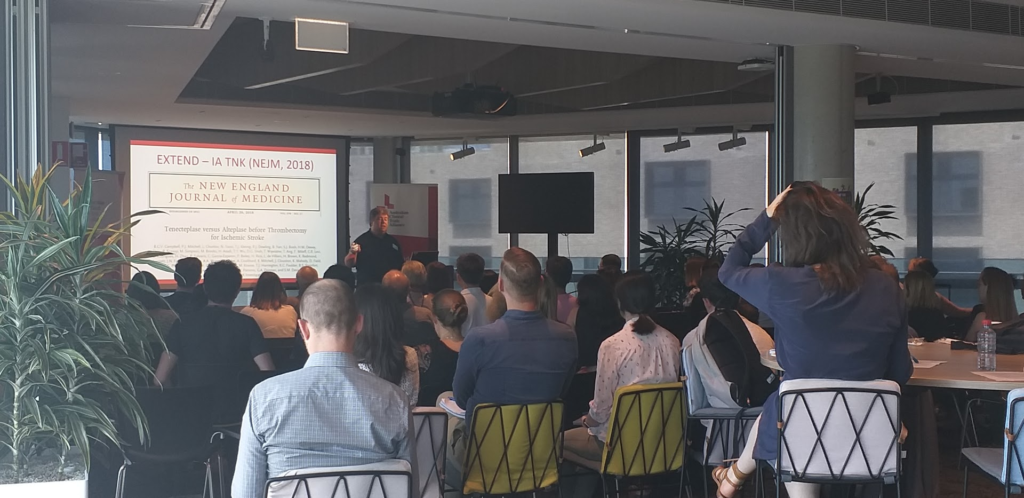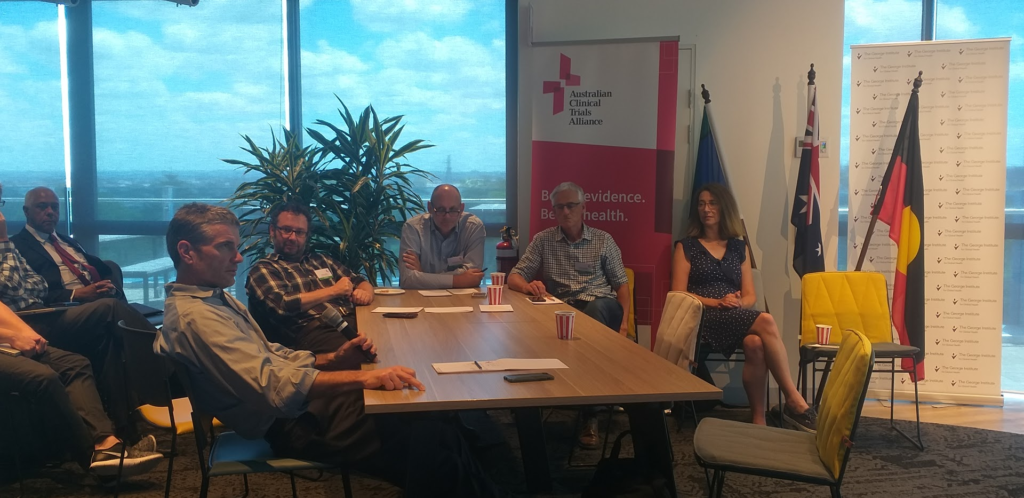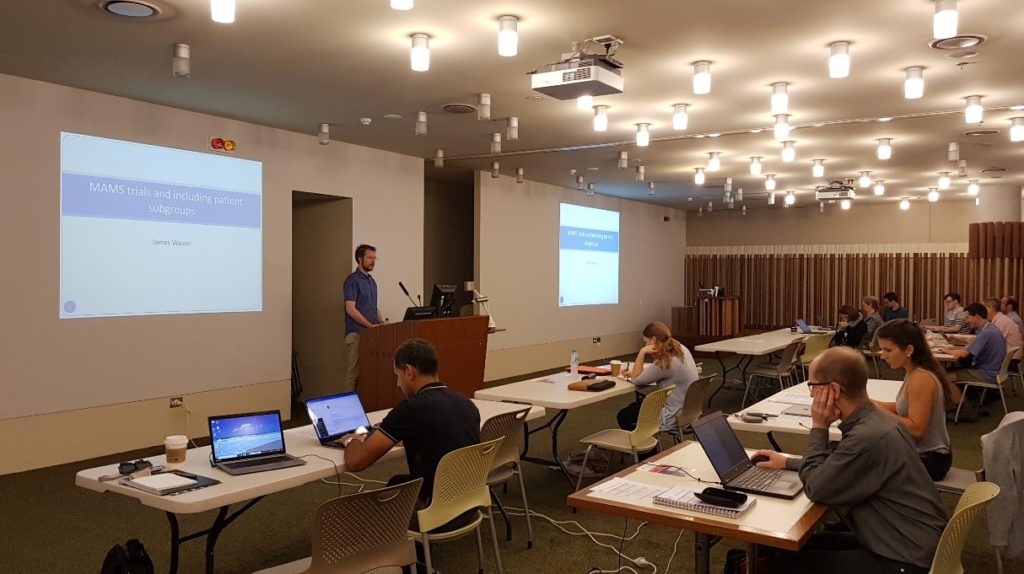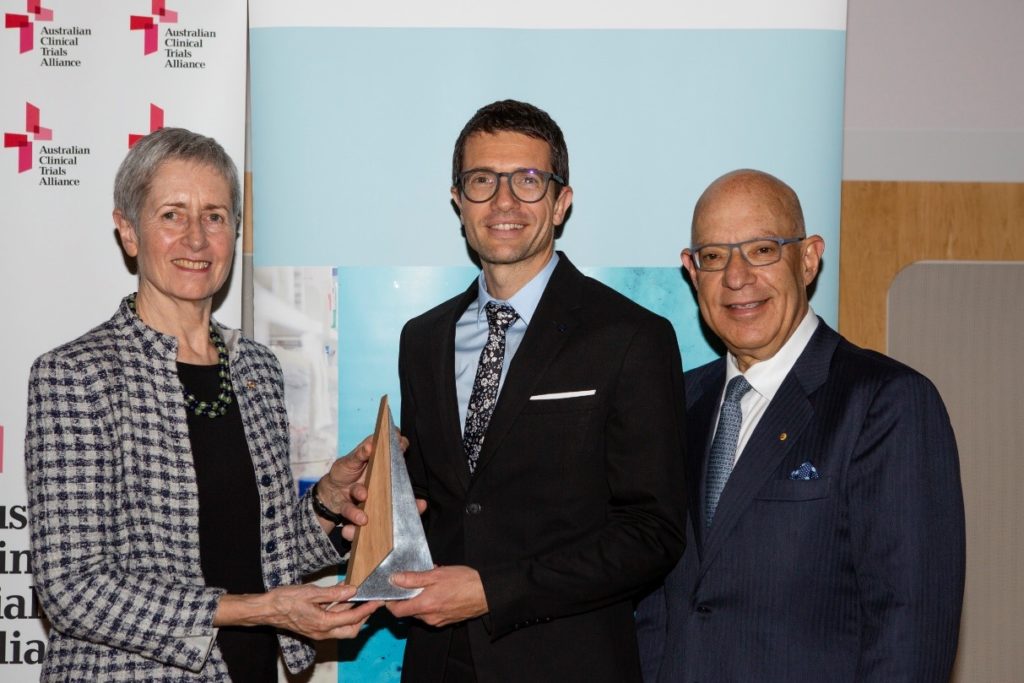ACTA 2019 Summer School events
In collaboration with ACTA’s Innovative Trial Design Reference Group, a range of educational workshops and seminars were held online and in Melbourne, Sydney and Brisbane during the first half of the year.
Innovative Trial Design Seminar

A full-day Innovative Trial Design Seminar took place at The George Institute in Sydney on 14 February. The workshop included an introduction to adaptive trials, with examples of multi-arm multi-stage designs and Bayesian response-adaptive designs. We were lucky to have a range of international and local experts including Dr Scott Berry, one of the international leaders in Bayesian adaptive trials. The event was attended by about 100 attendees and audience participation was lively in the question and answer sessions. More details can be found here.
Innovative Trial Design Clinic

The introductory seminar was followed the next day by an interactive “clinic” which welcomed trialists to present their study questions to a panel of expert clinicians and statisticians for advice on designing efficient trials using novel approaches to resource allocation and decision-making. Audience engagement was high and the panel also shared their experience of securing funding and presenting complex designs to investigators, reviewers and ethics and governance committees. This event took place at The George Institute in Sydney on 15 February.
Adaptive designs and multiple testing procedures for clinical trials workshop

The Innovative Trial seminar and Clinic were followed by a two-day multi-arm multi-stage (MAMS) workshop in Melbourne on 21-22 February, presented by Prof James Wason (Newcastle University and MRC Biostatistics Unit, University of Cambridge), Dr Michael Grayling (Newcastle University), Prof Adrian Mander and Dr David Robertson (MRC Biostatistics Unit, University of Cambridge). It was repeated in Brisbane on 25-29 February, and Sydney on 28 February-1 March. The workshop content was designed to provide materials, tools and examples to guide the design of a MAMS trial. Feedback from almost 100 participants across the three locations indicated that the UK team delivered an outstanding workshop and provided the training necessary to implement a simple MAMS trial. We’d like to thank ViCBiostat, Melbourne Academic Centre for Health, the University of Queensland’s Centre for Health Services Research and the George Institute for their support in making these events possible.
Webinars
Four statistics-focused webinars were held as part of the Weekly Webinar series ACTA held in April-July 2019.
A webinar on Studies Within a Trial (SWATs) was provided by Prof Shaun Treweek (University of Aberdeen, UK) on 17 April. Shaun explained how SWATs can fill gaps in evidence-based clinical practice and why they are important. In summary, he provided some practical ‘top tips’ that come from existing experience of doing SWATs.
In the first of two Hackathons of Novel Trial Designs on 1 May, Prof David Paterson (University of Queensland) presented on designs in which a participant undergoes serial re-randomisation dependent on course of illness and Prof John Simes (University of Sydney) presented on SOCRATES – Standard of Care Randomised Trials to Enhance the Science of Medicine. In the second Hackathon on 15 May, Dr Jessica Kasza (Monash University) presented on optimal multiple period cluster cross-over designs and Prof Tom Snelling (Telethon Kids Institute) presented on designs that allow clinician preference to be incorporated within treatment allocation. Jessica also presented at the ACTA International Clinical Trials Conference on 2-5 October.
Last but not least was a webinar by the leading statistical expert on adaptive clinical trial designs, Dr Scott Berry on 26 July. Scott walked us through the draft FDA Guidance Document on Adaptive Design Clinical Trials for Drugs and Biologics and highlighted the positive impact of this guidance on the design of clinical trials. He summarised what can be adapted and how and brings us back to the four core principles: “the chance of erroneous conclusions should be adequately controlled, estimation of treatment effects should be sufficiently reliable, details of the design should be completely prespecified, and trial integrity should be appropriately maintained.”
Recordings of these webinars are available on the ACTA YouTube Channel.
We look forward to running more events like these in the future. If you have any suggestions, know of any opportunities to collaborate, or have specific requirements for training at your organisation, please get in touch.
ACTA Excellence in Trial Statistics Award

ACTA’s fourth annual Clinical Trials National Tribute and Awards Ceremony was held at the Royal Children’s Hospital Melbourne on 20 May. ACTA STInG’s third Excellence in Trial Statistics Award was awarded to the ADRENAL trial (Adjunctive CorticosteRoid TrEatment iN CriticAlly IlL patients with septic shock); a randomised blinded placebo-controlled trial of hydrocortisone in critically ill patients with septic shock trial which was conducted by The George Institute in Sydney. Congratulations to the award recipients and thank you to our independent statistics judging panel who volunteered their time and expertise. Read more about the event here.
ACTA International Clinical Trials Conference

ACTA hosted its International Clinical Trials Conference in Sydney on 2-5 October. The conference was well attended by clinicians and statisticians alike. It was great to see a number of talks on statistical methodology, including an invited session on Topical Statistical Issues in Trials on Thursday 3 October, as well as a number of contributed talks. There was a pre-conference course on Data and Safety Monitoring Boards aimed at both clinicians and statisticians provided by the NHMRC Clinical Trials Centre on Wednesday 2 October.
During the conference there was a meeting of STInG which occurred 12.45-1.15pm AEST on 3 October and was attended by 26 members of STInG. At this meeting we discussed and brainstormed future ventures of the group. Attendees indicated a need for more communication from STInG, more collaboration of STInG with the Statistical Society of Australia on topics of interest for statisticians working in clinical trials, and guidance on reporting clinical trials in a reproducible way. The slide set outlining past and proposed initiatives of STInG as presented at this meeting can be found here
Furthermore, the STInG group convened a meeting for members interested in developing training for Data Safety and Monitoring Boards (DSMBs) on 4 October. This was attended by 15 members of Reference Group G and STInG. Key points discussed included currently available courses for those interested in DSMBs, the gaps in available courses, and what could be done to close the gap, and enable the development of a professional network in this particular area.
ACTA STInG Statistical Expert database
Our next initiative is to map out the landscape of statistical support available across the country, and to use this to develop a proposal for a structured support system for statistics in trials. This will include creating a list of statisticians willing to serve as a member on a Data Safety and Monitoring Board. A survey will be sent out shortly and we are looking forward to hearing from you.
Additional events of interest to STInG members
NHMRC Symposium on Research Translation
The NHMRC Symposium on Research Translation will take place in Melbourne on 19-20 November. The theme will be 'Research Translation in the digital age: harnessing the power of data and analytical technologies'. More details can be found here.
Workshop on Pragmatic randomised trial designs for evaluating health policy and practice change interventions

Bayesian Adaptive Trials Workshops: Perth
Designing innovative trials, including Bayesian adaptive trials, was a hot topic at this years’ 2019 ACTA conference in Sydney. We are pleased to announce that a Bayesian adaptive trials workshop will be held in Perth, 4-5 December 2019 to help researchers and statisticians gain knowledge and practical skills to design these types of trials. This workshop will be run by Bayesian clinical trial experts Ben Saville, PhD & Anna McGlothlin, PhD from Berry Consultants (Texas, USA) and Mark Jones and Julie Marsh, PhD from the Telethon Kids Institute (Perth, AUS).
Registration for the workshops opened on Friday 25th October 2019.
For more information on the workshops or to register, please visit: https://adaptivehealthintelligence.org.au/news-events/
Bayesian Adaptive Trial Design: Two-day workshop
This workshop will be held on the 27–28 February 2020 in Melbourne and 5-6 March 2020 in Sydney. Presenters will include international experts Lorenzo Trippa and Steffen Ventz.
Further details of this workshop will be posted on the ACTA website in due course.
